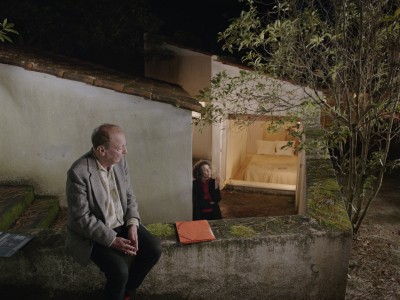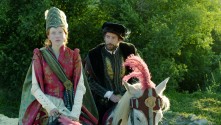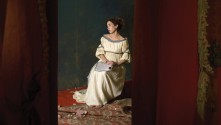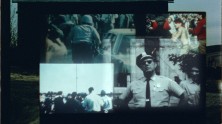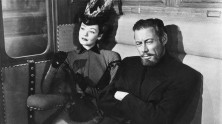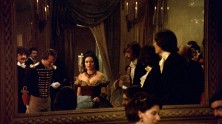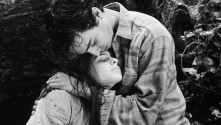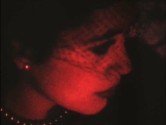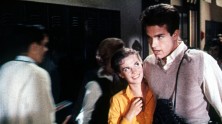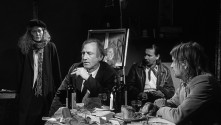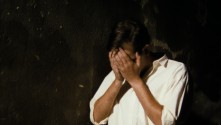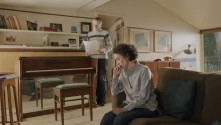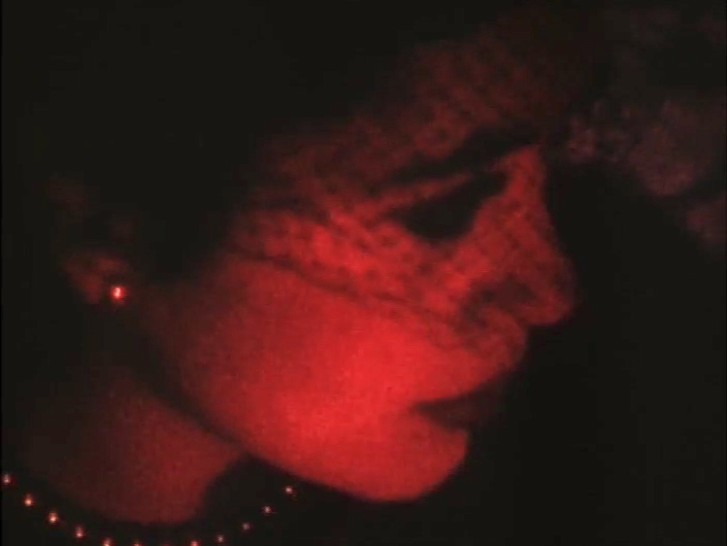
D. Jaime ou a Noite Portuguesa
Padres
Screening on Film
The April revolution—which, in 1974, liberated Portugal from dictatorship—was in its infancy. The ebullience on the margins of culture was fascinating. Luís Noronha da Costa, the architect-painter, was trying his hand at cinema, “architecting” films in Super 8, sometimes in 16mm, with a small group of friends in which I found myself included.
Of the first film João Bénard da Costa said: “In D. Jaime, fiction is more clearly expressed than in other films by Luís Noronha, because there is a ‘story.’” It's a Sade-like narrative, with an exaggeratedly pure peasant girl; her chaste (but naked) boyfriend and the sinister D. Jaime, the lustful nobleman who wants to commit nefarious acts with the maiden and kidnaps her. It was the beginning of my very brief career as an actress: a peasant girl, so exaggeratedly pure that she was called Clara. From peasant to courtesan, as if in a Terence Fisher world visited by the imagery of romanticism.
In Padres I was another Rita, the one in the film, somewhere between coquette and femme fatale, in the house of two cats who squabble for food while the two priests—representing everything but poverty, chastity and obedience—squabble for the woman's body.
Lights from oil lamps, mirrors, pearls, the sea and the beach, are recurring themes and sources of light in Luís Noronha's paintings. Only later, when I saw the film, did I discover this. The actor doesn't want to know about the film at all, only his character interests him, it gives him the pleasure to be, as it gave me to be Rita in this ménage à trois painted by Luís. – RA
------------------------------------
A revolução de Abril (que em 1974 libertou Portugal da ditadura), estava em gestação. A ebulição nas margens da cultura era fascinante. Luís Noronha da Costa, o arquitecto pintor, experimentava o seu caminho pelo cinema, arquitetctando filmes em super 8, por vezes em 16mm, com um pequeno grupo de amigos nos qual me vi incluída.
Do filme disse João Bénard da Costa: “em D. Jaime, a ficção é mais claramente expressa do que em outros filmes de Luís Noronha, pois que há uma ‘história.’” É uma narrativa à Sade, com uma camponesa exageradamente pura; o seu casto namorado (mas de tronco nu) e o sinistro D. Jaime, o fidalgo lúbrico que quer cometer actos nefandos com a donzela e a rapta. Foi o início da minha brevíssima carreira como actriz: uma camponesa, tão exageradamente pura que se chamava Clara... de campónia a cortesã, como num mundo à Terence Fisher visitado pelo imaginário do romantismo.
Em Padres fui uma outra Rita, a do filme, entre cocotte e mulher fatal, na casa dos dois gatos que disputam a comida enquanto os dois padres disputam o corpo da mulher, representando tudo menos a pobreza, a castidade, e a obediência.
Luzes de candeeiros de petróleo, os espelhos, o mar e a praia, as pérolas, são temas e fontes de luz frequentes em pinturas de Luís Noronha. Só depois, quando vi o filme, o descobri. O actor não quer saber do filme para nada, só o seu personagem lhe interessa, lhe dá prazer ser, como a mim deu ser a Rita neste ménage à trois pintado pelo Luís. – RA
PROGRAM
-
D. Jaime ou a Noite Portuguesa
Directed by Luís Noronha da Costa.
With Rita Azevedo Gomes, André Gomes, Antonio Caldeira Pires.
Portugal, 1974, 16mm, color, 62 min.
Portuguese with no subtitles.
Print source: Cinemateca Portuguesa
-
Padres
Directed by Luís Noronha da Costa.
With André Gomes, Rita Azevedo Gomes, Luís Vilaça.
Portugal, 1975, 16mm, color, 41 min.
Portuguese with no subtitles.
Print source: Cinemateca Portuguesa
